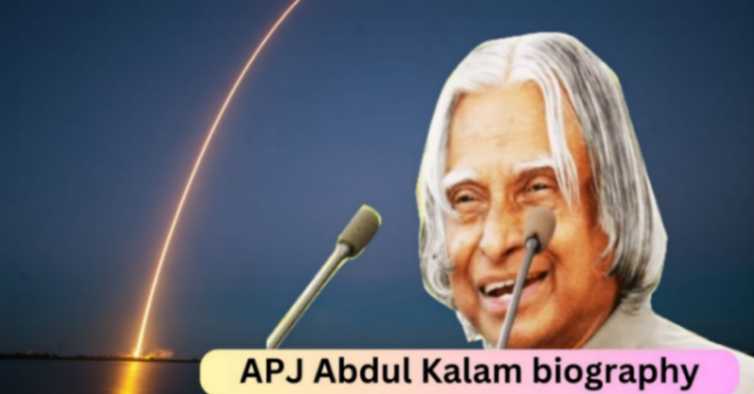APJ Abdul Kalam was born in Rameswaram, Tamil Nadu on 15th October 1931.His father was a boat owner and an Imam of local mosque. At the very young age of 6 years he was fascinated by the techniques of boat building. Dr. Abdul Kalam became the 11th President of India on 25th July 2002. He had a vision of India becoming a super power by 2020 with the participation of youth and by utilising advanced technology. we will explore his life and contributions in APJ Abdul Kalam biography
APJ Abdul Kalam Educational Background
At the Schwartz School in Ramanatha Puram, he completed his higher secondary education and arrived in Trichy in 1950. After Completing his physics degree from Trichy’s St. Joseph’s College, he enrolled at MIT Chennai to pursue further education. In 1960, he passed out from MIT with the degree in Aero Engineering.
Upon joining Hindustan Aeronautics Ltd. (HAL) as a trainee, he gained expertise in engine overhauling. To attend an Air Force selection interview, he traveled to Dehradun. He visited the Shivanada Ashram after the interview didn’t go well. Swami Shivanada assured him that he would have more fantastic opportunities.
APJ Abdul Kalam Official Positions
At the Directorate of Technical Development and Production (DTDP) in Delhi, he started off as a senior scientist. He then moved to the Aeronautical Development Establishment (ADE) in Bangalore.
For a span of four and half decades, he holds official positions of three scientific establishments— Space, Defense Research and Atomic Energy.
ISRO (1963–1982): APJ was the project director for the SLV-3 satellite launch vehicle. He Contributed significantly for India’s space programme, Rohini satellite was launched successfully into Space on July 18, 1980.
Defense Sector: From 1982 onwards, he started working in DRDL. He is the person responsible for developing missile technology such as Intercontinental Ballistic Missile (ICBM), Agni and Prithvi missiles. Prithvi missiles are indigenous which can carry 1000 kg weight to a distance of 250 Km. Nuclear technology represented his third major accomplishment. Subsequently, he served as a TIFAC director.
Scientific Advisor to Defense Ministry: During 1992 to 1999, Dr. Kalam served as The Government of India’s Principal Scientific Secretary and secretary of DRDO.
President of India: He became the 11th President of India from July 18, 2002, to 2007.His presidency was marked by accessibility of public to visit Rashtrapathi bhavan and interaction with students.
After his tenure as President, he worked as a faculty member at Anna University.
Awards: Bharath Ratna (1997), Arya Bhatta Award (1994), Padma Vibhushan (1990) and Padma Bhushan (1981) were among the honors awarded to him.
In order to give a lecture at the Indian Institute of Management Shillong, Kalam traveled to Shillong on July 27, 2015. He fell unconscious after just five minutes of his lecture and the humble soul departed this world.
APJ Abdul Kalam Thoughts
Spirituality: APJ was a man of faith and spirituality. He frequently expressed his gratitude to his parents for developing morals and spirituality in him. He describes his relationship and spiritual encounters with BAPS leader Pramukh Swamiji in his book Transcendence: My Spiritual Experiences with Pramukh Swamiji. He highlighted how important spirituality is to science and education. Additionally, he emphasized the need for young people to have creative leadership.
Youth Empowerment: To inspire young people, he penned books like “Ignited Minds”,” Wings of fire “, and “India 2020: A Vision for the New Millennium”. In 2020, a self-reliant superpower and a developed India were his vision.
He has designated five focus areas: Infrastructure and electricity, Technology advancement, Agriculture and food processing, Education and health, and information technology and communication. He believed that “A nation needs both economic prosperity and strong security for growth and development.”
“Technology is a group activity and it is not based on individual intelligence”
He has a vision of developing medical devices indigenously by making use of defense technology
Great Motivator: According to him Failure is not fatal.” Failures contain within themselves the seeds of further learning which can lead to better technology, and eventually, to a high level of success.”
He always thought of ways to ignite the minds of the youth and how to ensure their participation in nation-building activities. He believed that India could achieve that aim by correctly setting goals and utilizing highly educated human resources.
Conclusion
APJ Abdul Kalam was a renowned Indian engineer and statesman. Along with his vision of a developed India that prioritized youth empowerment education and the fusion of science and spirituality, he was well-known for his contributions to space and missile technology
APJ Abdul Kalam Quotes famous 10
• “A dream is not that which you see while sleeping; it is something that does not let you sleep”.
• “Dream, dream, dream. Dreams transform into thoughts, and thoughts result in Action”.
• “All of us do not have equal talent. But all of us have an equal opportunity to develop our talents.”.
• “Excellence happens not by accident. It is a process. Creativity is seeing the same thing but thinking differently.”
• “You cannot change your future, but you can change your habits, and surely your Habits will change your future.”.
• “The best brains of the nation may be found on the last benches of the Classroom “.
• “Educationists should build the capacities of the spirit of inquiry, creativity, entrepreneurial and moral leadership among students and become their role model”.
• “It does not matter how large or small your sphere of activity is; what counts finally is the commitment that you bring to your job that has been ordained by you in this life.”
• “Creativity learning gives creativity; creativity leads to thinking; thinking provides knowledge; knowledge makes you great.”
• “Where do evils like corruption arise from? It comes from never-ending greed. The fight for a corruption-free ethical society will have to be fought against this greed and replaced with What can I give spirit?”
FAQ
APJ Abdul Kalam full name
Dr. Avul Pakir Jainulabdeen Abdul Kalam, known as “Missile Man of India”

